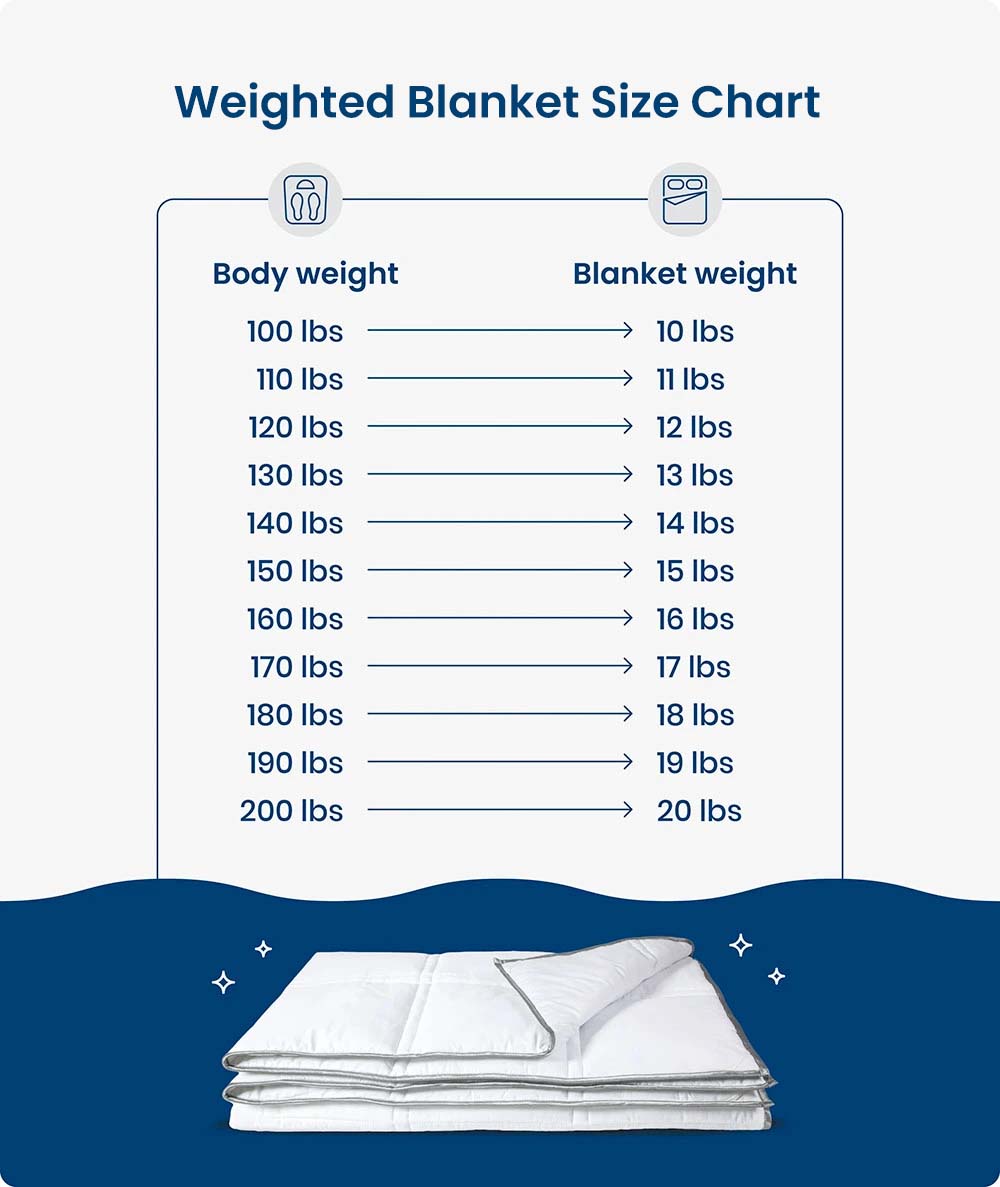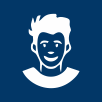If you want to experience more or better sleep, you’re not alone. The majority (57%) of Americans say they would feel better if they got more sleep — but many struggle to do so, often for years. Common solutions to this problem include things like herbal sleep aids, nighttime routines, and optimized blankets, pillows, and mattresses.
A weighted blanket is a common milestone on the path to better sleep. And if you’ve ever wondered how heavy a weighted blanket should be to get those golden eight hours of shut-eye, we’ll break it down for you here. We'll also cover the benefits of a weighted blanket and how to choose the best one for you.
Weighted Blanket Size Chart
As a general rule, your weighted blanket should be 10% of your body weight. Most weighted blankets run between 12 and 20 pounds, although it is possible to find them in heavier weights. Check out the chart below to find the best weight for your weighted blanket.

| Weighted Blanket Size Chart | |
|---|---|
| Body Weight | Blanket Weight |
| 100 lbs | 10 lbs |
| 110 lbs | 11 lbs |
| 120 lbs | 12 lbs |
| 130 lbs | 13 lbs |
| 140 lbs | 14 lbs |
| 150 lbs | 15 lbs |
| 160 lbs | 16 lbs |
| 170 lbs | 17 lbs |
| 180 lbs | 18 lbs |
| 190 lbs | 19 lbs |
| 200 lbs | 20 lbs |
What Is a Weighted Blanket?
A weighted blanket or comforter is a particular type of therapeutic blanket, usually filled with something heavy like sand or microglass beads. It can also just be constructed from heavy material. These blankets provide many health benefits, including a relaxed nervous system, better sleep, and more, making them a popular choice for anyone who wants to improve their rest.
You can get a weighted blanket in almost any size or shape — up to 50 pounds — but it’s essential to match the size of your blanket to your body, weight, and goals.
Weighted Blanket Weight Guide
As mentioned above, the standard advice is to keep your weighted blanket as close as possible to 10% of your body weight. This is more of a guideline than a rule, however! Some people prefer firmer pressure, while others prefer lighter pressure, so use your best judgment when it comes to personal preference.
That said, it’s generally safest to keep your weighted blanket between 5% and 12% of your body weight. And don’t go over 15%, as this could be a safety hazard.
How Heavy Should a Weighted Blanket Be for an Adult?
For adults, start with the 10% rule. Follow the weighted blanket weight chart to find your body weight and match it with the appropriate blanket size. From there, experimentation may be in order!
If you’ve never experienced the joy of a weighted blanket before, you may want to try out 10% and move up or down in weight as your pressure preference, body composition, and anxiety levels dictate.
Whether you’re sharing your blanket can also be a factor here. While you may not want to share your blanket — especially if it’s custom-weighted for you — sometimes couples want to compromise and get a blanket both parties can use comfortably. If this sounds like you, consider including your partner in the decision about what weight of blanket to purchase.
How Heavy Should a Weighted Blanket Be for a Child?
Children have different needs for weighted blankets than adults, so consider a few additional factors if you’re buying for a child. Children will need a blanket that is both lighter and a smaller percentage of their overall body weight. They must be able to remove the blanket themselves at all times.
According to Kelly Tanner, Ph.D., OTR/L, BCP, and Kristen Martin, OTR/L, at Nationwide Children’s, never use a weighted blanket for a child under 1 year of age. Ideally, you would consult your child’s pediatrician before purchasing a weighted blanket for a child of any age.
What Is the Ideal Weighted Blanket Weight for a Couple?
Looking for a weighted blanket you can share with a partner? Your blanket needs may differ slightly. While the 10% rule is great for an individual, if you’re shopping for a couple, there’s a bit more to consider. Your partner may not have the same needs and wants in bedding as you do — and that means compromise.
To start, you’ll want to consider your and your partner’s weights. If the two of you are similar weights, you may be able to use the same blanket. Just find your own weight on the chart above, and get a blanket that will then suit you both. (Or get two if you don’t feel like sharing.) If you opt for a larger comforter size, you may choose a heavier blanket since the weight will be spread over two people.
The real challenge arises when you and your partner are different weights. Many in this situation opt for the blanket that matches the lighter person’s weight so as not to make the lighter person uncomfortable. Purchasing two blankets may also be the solution here!
Can a Weighted Blanket Be Too Heavy?
How much cozy is too much cozy? Yes, it’s possible to have a weighted blanket that’s too heavy. If you’re having trouble breathing when you lie down for the night or your sleep is disrupted due to the weight of the new blanket, it’s too heavy! Switch to a lighter blanket as soon as possible if you notice any of these signs.
If you’re new to weighted blankets, we recommend starting with a blanket that’s less than 10% of your body weight and working your way up from there.
How To Choose a Weighted Blanket
Ready to choose a weighted blanket? Let’s walk through the process of picking out the perfect blanket for your needs.
1. Choose your starting weight
- Step one is to match your weight to the weighted blanket chart listed above, using the basic rule of 10% of your body weight. This is just step one, however — so don’t click “buy” quite yet.
2. Incorporate personal idiosyncrasies
- Now that you’ve found your starting blanket weight, take into account your personal needs and preferences. If you’re short, for example, you may prefer a lighter blanket as there will be less physical real estate for distribution.
- Do you sleep on your side or stomach? A weighted blanket may not be right for you, or you may want to try a lighter weight or material. You may prefer more ease of movement throughout the night than a heavier blanket allows.
3. Try Before You Buy
- Hands-on experience is hands-down the best way to make a purchase decision. If you can, head to the store before buying a weighted blanket and try out the different weights. See how you feel about each one, and use that experience to pick the most comfortable weight.
- If you buy online, check the return policy and only purchase from somewhere that will allow you to exchange for a different weight if needed.
4. Final considerations
- Always make sure you’re getting the right blanket for your intended use. Some blankets that come in larger sizes — like king or queen — are only intended for shared use.
- If you have any health conditions that might make using a weighted blanket dangerous, be sure to consult a doctor before use.
- If you’re buying for a child, consult their pediatrician before adding a weighted blanket to any nighttime routine.
Weighted Blanket Benefits

| Benefits of a Weighted Blanket | ||
|---|---|---|
| Improved sleep quality | Enjoy a deeper, more restful sleep under a comforting weight |  |
| Reduced stress and anxiety | Calms anxious and restless thoughts |  |
| Relief from physical symptoms | Get relief from chronic pain, aches, and fibromyalgia symptoms |  |
| Benefits for ASD and ADHD | Provides a grounding effect that may help with autism and ADHD |  |
The benefits of sleeping with a weighted blanket are many and varied. These are a few of the most commonly cited benefits — but this is by no means a comprehensive list.
Improved Sleep Quality
If you want deeper, calmer, more restful sleep, weighted blankets may be the answer you’ve been looking for. The deep pressure stimulation (DPS) provided by weighted blankets has been shown to promote the necessary melatonin production we need to sleep (and sleep well!).
Combat stress and anxiety
If you struggle with anxiety or racing thoughts at night, a weighted blanket may be the solution. Weighted blankets provide a sensation not unlike a big, warm hug, which can trigger the release of serotonin, a calming hormone. This can help lower stress levels enough to drift off to sleep.
Relief from chronic pain
Chronic pain sufferers, rejoice! Weighted blankets can offer significant relief from the physical symptoms of chronic conditions like fibromyalgia. This is due again to the impact of DPS on the body.
Calm for ASD and ADHD individuals
If that’s not enough benefits to convince you to click that buy button, weighted blankets may also benefit those with autism spectrum disorder (ASD) or ADHD. That handy DPS mentioned above calms racing thoughts and provides a grounding effect — making weighted blankets popular among these groups.
The Key To Choosing the Right Weighted Blanket Weight
How heavy should a weighted blanket be? How much does the ideal weighted blanket really weigh? If we’ve learned nothing else today, we’ve learned that the answers to these questions vary widely! There’s no one-size-fits-all solution, and weighted blankets vary as much as the individuals who seek them out.
Finding the best weight for your weighted blanket can be a journey — but the rewards are often worth it. From sounder sleep to calmer days, you’ll wonder how you survived without one.
Ready to choose your own weighted blanket? Check out our personal favorite: the luxurious Eli & Elm weighted comforter.












